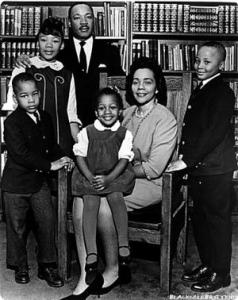Today is a day to reflect on the strength, vision, and resolve of one man who shaped the world to come. How can you translate the message and lessons of Dr. King to your kids? – as they ARE the future leaders in this world.
What Martin Luther King, Jr.’s Words Can Teach Your Kids Today
Martin Luther King, Jr. Day, this coming Monday, can be much more than just a day off from work and school. It can be a day to remind your kids about the ongoing importance of racial and cultural equality. Here are important quotes from Dr. King, and ways you can use them as a conversation springboard from Maureen Costello, director of the Teaching Tolerance program at the Southern Poverty Law Center in Montgomery, AL.
“I have a dream that my four little children will one day live in a nation where they will not be judged by the color of their skin, but by the content of their character.”
Although many aspects of Martin Luther King, Jr.’s dream have come true since he spoke these famous words in 1963—we have an African American president, for instance—kids should know we still have a long way to go, says Costello. If your children are old enough to understand or are asking questions, talk to them about current racial events. Explain how people of color may still be unfairly stereotyped or targeted—by law enforcement agents, shop owners worried about theft, even a pedestrian who clutches her purse a little more tightly when passing an African American teen. “If your kids wonder why this happens, remind them that America has a long history of treating people differently due to their race (the first slaves were brought to Jamestown in 1619), and it can take a really long time for people to change their thinking,” says Costello.
Interestingly, Costello says this quote is often used as a justification for ignoring racial differences. “Colorblindness shouldn’t actually be the goal,” she says. “People’s racial and cultural identities are important to them, and we don’t want to discount that.” Remind kids that polite questions about racial and cultural differences can help encourage better understanding: “What special foods from your culture are your favorites?” or “Tell me what you do at your church since it’s different from mine. I’m interested.”
“Injustice anywhere is a threat to justice everywhere.”
The takeaway message for your kids: When we ignore bad behavior or unfair treatment because it doesn’t directly affect us, that bad behavior may spread—and even hit home. You don’t necessarily have to use racial issues as an example on this one, says Costello. For instance, if there’s a kid in your child’s class who’s, say, left out by other kids because her clothes are always dirty, your child might not see anything wrong with avoiding her. Costello suggests challenging that choice. Remind your child that the next kid to be excluded could be someone who’s different in another way—hair color, left-handedness and so on. However, if a lot of children treat one classmate unfairly, it may be tough for your child to speak out, and that’s okay. “Tell your child, ‘If you get a funny feeling in your stomach that someone isn’t being treated right, give it words. Tell a teacher or other trusted adult and see if they can help,’” she says.
“The ultimate tragedy is not the oppression and cruelty by the bad people but the silence over that by the good people.”
First, remind your child that most people are good and want to do good things; there are relatively few bad people in the world. However, this quote is another opportunity to encourage your child to speak up or tell and adult when they see unfair behavior (racially motivated or otherwise). “Tell your child, ‘If the good people don’t stand up and say something, the bad people will win’—a concept kids usually understand pretty clearly,” says Costello.
Follow this link to continue reading this article in its entirety.
